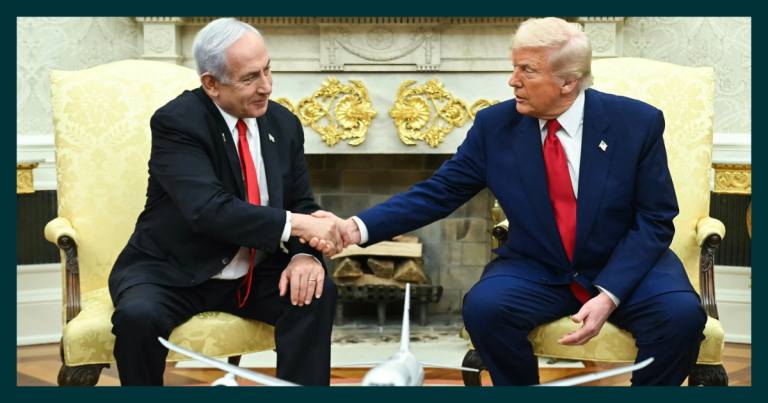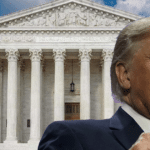
President Trump met with Israeli Prime Minister Benjamin Netanyahu at the White House on Monday, a powerful display of alliance between two leaders committed to confronting mutual threats in the Middle East. Sitting side by side in the Oval Office, the two presented a united front that sent an unmistakable message to America’s adversaries. The meeting addressed several critical issues, including the ongoing effort to free hostages held by Hamas and the growing regional tensions.
But behind the diplomatic niceties, a far more consequential development was brewing – one that could fundamentally reshape America’s approach to its most persistent Middle Eastern foe.
Netanyahu’s visit comes at a critical moment for the region. Hamas continues to hold Israeli hostages, Iran’s proxies are causing havoc across multiple countries, and Tehran’s nuclear ambitions remain unchecked. Let’s be honest – this meeting demonstrated that after years of weakness under previous administrations, America once again stands firmly with its allies. What a refreshing change, isn’t it?
“We’re both united in the goal that Iran does not ever get nuclear weapons,” Netanyahu declared during the press conference, reflecting the shared commitment that has defined the renewed U.S.-Israel relationship under President Trump.
Then came the bombshell announcement that few saw coming. Speaking candidly before reporters, President Trump revealed that direct nuclear talks with Iran will take place this weekend – a significant diplomatic breakthrough after years of Tehran’s refusal to engage directly with American negotiators.
From ‘Washington Free Beacon’:
We have a very big meeting on Saturday, and we’re dealing with them directly,” Trump said. “We are meeting, very importantly, on Saturday at almost the highest level.
This dramatic shift comes despite Iran’s foreign ministry stating earlier that same day that they would only participate in indirect talks through intermediaries like Oman. Once again, President Trump has demonstrated his unique ability to bring even the most recalcitrant adversaries to the negotiating table. Remember when “experts” claimed Trump’s approach would lead to war? How’d that prediction work out?
Trump’s Diplomacy with a Fist
What makes Trump’s approach so effective is that it’s diplomacy backed by unmistakable strength. Unlike his predecessors who begged Iran for engagement while lifting sanctions (and sending pallets of cash!), Trump made it crystal clear there would be severe consequences if diplomacy fails.
“I think if the talks aren’t successful with Iran, I think Iran is going to be in great danger,” Trump stated bluntly, sending shivers through Tehran’s ruling mullahs.
That’s how you negotiate from a position of power. Trump understands what the previous administration never grasped – that Iran only responds to strength, never to weakness or appeasement. By keeping military options explicitly “on the table,” he’s ensuring Iran knows exactly what’s at stake if they continue their nuclear ambitions.
Trump expressed optimism about a potential deal but emphasized that negotiations would not continue indefinitely. This is precisely the time-bounded, results-oriented approach that was missing for so many years.
Netanyahu’s Red Lines
For his part, Netanyahu was not shy about outlining what an acceptable deal would require. In statements released after his White House meeting, the Israeli Prime Minister clarified that any diplomatic solution must involve physically destroying and dismantling Iranian nuclear infrastructure.
“We go in, blow up the facilities, dismantle all the equipment, under American supervision and American execution—that is good,” Netanyahu stated, referencing Libya’s 2003 nuclear disarmament as a model.
This is the kind of clear-eyed realism that has been absent from international diplomacy for too long. No more wishful thinking or paper promises – Netanyahu understands that only verifiable destruction of nuclear infrastructure can guarantee security.
The Israeli leader also warned that if Iran seeks to drag out talks without tangible progress, military action would become necessary – a sentiment he discussed thoroughly with President Trump during their meeting.
Tehran’s Desperate Resistance
Iran’s initial insistence on indirect talks reveals its weakened position. Despite their public bravado, economic sanctions have devastated their economy, and internal protests continue to threaten the regime’s stability.
Tehran has reportedly warned neighboring countries – including Iraq, Kuwait, UAE, Qatar, Turkey, and Bahrain – that they would face retaliation if they assist with any U.S. military strike. These threats speak volumes about Iran’s growing desperation and isolation.
The contrast couldn’t be clearer between Trump’s decisive leadership and Iran’s flailing attempts to maintain some semblance of leverage. When America leads from a position of strength, rogue nations have no choice but to reconsider their behavior.
The hard truth is that Iran has never responded to weakness – only to strength. President Trump’s approach represents a return to the time-honored principle of peace through strength that guided America through the Cold War. By offering diplomacy while simultaneously making clear the consequences of failure, Trump has created the optimal conditions for a breakthrough that eluded previous administrations.
As America watches this high-stakes diplomatic chess match unfold, one thing is certain: we finally have a president who understands that the best way to avoid conflict is to be thoroughly prepared for one. The Iranian regime now faces a clear choice – genuine diplomacy or “great danger.” For the sake of peace, let’s hope they choose wisely.
Key Takeaways
- Trump’s direct nuclear talks with Iran mark a dramatic shift from Tehran’s previous refusal to engage with American negotiators.
- Unlike previous administrations, Trump backs diplomacy with clear military consequences if Iran continues its nuclear ambitions.
- Netanyahu outlined strict conditions for any deal, including the physical destruction of nuclear infrastructure similar to Libya’s 2003 disarmament.
- Iran’s threats to neighboring countries reveal its growing desperation as Trump’s strength-based approach forces Tehran to reconsider its behavior.
Sources: Source, The Media Line


